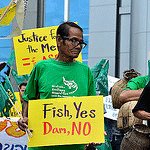Social Watch News
Published on Thu, 2013-03-14 22:09
Malta, like all New Member States of the European Union, pledged to reach a level of official development assistance (ODA) of 0.17% of its gross national income (GNI) by 2010 and to increase it to 0.33% by 2015. Does Malta keep its promises to eradicate poverty in the world? Civil society organizations have expressed their concern given that the government spends a large amount of ODA funds in the detention of irregular immigrants, many of them asylum seekers, the vulnerability of most of which is recognized through their refugee status or other forms of protection. Although the improvement in the distribution of ODA should be noted, 88% of bilateral aid is not clear. This is the reason why the government has been most criticized by NGOs in Malta and abroad. |
Published on Thu, 2013-03-14 21:37
The approval of the 2010-2030 Energy Development Plan in Thailand will promote energy inequality among the population and the poorest will bear the heavy environmental costs of power plants, coal plants and even nuclear reactors, undermining the achievements of the MDGs that the country claims to have achieved by 2015. Academics, civil society organizations and local community organizations have expressed their opposition, proposed a new plan based on a holistic approach to energy planning and urged to shift from the strong dependency on fossil fuel to use energy more efficiently using sources of renewable energy. The latest Energy Development Plan (2010-2030), elaborated mainly by the Electricity Generating Authority of Thailand, is strongly influenced by the demands of the automotive and foundry industries, which will lead the national development plan for the next 20 years. |
Published on Mon, 2013-03-11 13:40
On International Women’s Day the global civil society network Social Watch emphasised the challenges facing women in different parts of the world. Three articles on the impact on women of policies being implemented in Canada, Egypt and Korea, are being published, all of them national contributions to the Social Watch Report for 2013. |
| Published on Fri, 2013-03-08 11:55 |
Published on Fri, 2013-03-08 00:03
Canada’s economic policy continues to take reduction of the debt and deficit as its primary end. The means to this end include cuts to social infrastructure spending, public sector employment and the health and welfare institutions that used to put Canada near the top of most international measures of well-being. Under cover of deficit reduction, the Government of Canada continues to withdraw funding from the civil society organizations and research institutions that measure the effectiveness of those government policies and provide alternatives to them. The impacts of those cuts are beginning to become evident as income inequality grows. On the international stage, Canada has championed austerity measures for countries facing economic crisis, Canadian foreign aid has been in decline while the Government's criticism of multi-lateral institutions for international cooperation increases. If market conditions were ever to close the gap in Canada, this would have been the time. Social assistance rates have remained virtually unchanged across most of Canada. Most social assistance incomes in Canada remain well below the low income cut-off rate. The overall poverty rate in Canada is 9%, however, poverty rates continue to disproportionately affect women, Aboriginal peoples, and people with disabilities. For example, one in three Aboriginal and racialized people in Canada live in poverty. One in four people with disabilities, immigrants, and female single-parents in Canada live in poverty. Across all categories rates of poverty are higher for women than for men. |
Published on Thu, 2013-03-07 23:15
Almost two years have passed since human rights and feminists organizations expressed their deep concern at the escalation of policies that reinforce impunity, do not protect citizens and do not guarantee the right of peaceful assembly. The exclusion of women from the public sphere through direct incitement and aggression must be condemned. The heinous crimes of sexual violence can not be separated from the decline of the social status of women. The revolution of January 25, as the Egyptians call it, is the fourth in the last hundred and thirty years. The modern national movement has sought an effective national sovereignty, particularly with regard to economy and the ability to ensure socio-economic justice in the distribution of wealth and income. The Egyptian people discovered that without internal democracy it is impossible to preserve the conquests from previous revolutions. January 25 revolution asserts, then, the centrality of democracy, not only as a utopian goal, which practical implementation would be deferred indefinitely, but to lay the foundations of a modern, independent and prosperous country. |
|
Published on Thu, 2013-03-07 00:00
"Illicit financial flows - generated from crime, corruption, embezzlement and tax evasion - represent a major drain on the resources of developing countries, reducing tax revenues and investment inflows, hindering development, exacerbating poverty and undermining the enjoyment of human rights," a United Nations independent expert has said. In an interim report presented at the current twenty-second session of the UN Human Rights Council, Independent Expert on foreign debt Mr Cephas Lumina said that it is estimated that, on average, developing countries lost between US$783 billion and US$1,138 billion in illicit financial outflows in 2010. The expert added that these flows have increased in real terms to 8.6 per cent over the period 2001-2010, suggesting that existing measures to tackle the problem have not had a significant impact. |
Published on Mon, 2013-03-04 23:00
Since the end of the Korean War in 1950, the country has achieved sustained economic growth. GDP, which at that time was US$ 67, doubled in a decade, between 2000 and 2010, Korea joined the OECD in 1996 and achieved most of the Millennium Development Goals (MDGs). But inequality, as a side effect of economic growth, is present. There is no more extreme poverty but diversified poverty, and society still has challenges that are not shown by the indicators. The government's economic policy has encouraged assembling industry export-oriented with cheap labor. Between 2000 and 2009, relative poverty rates for children, seniors and women increased. Poverty is concentrated in the elderly at female level, low education, vulnerable health and in rural areas. It is clear that the government needs to implement policies to reduce socioeconomic inequality that go beyond reducing inequity and poverty, by creating quality jobs and social protection programs. |
| Source: . Published on Mon, 2013-03-04 23:00 |
| Published on Fri, 2013-03-01 09:34 |
SUSCRIBE TO OUR NEWSLETTER









